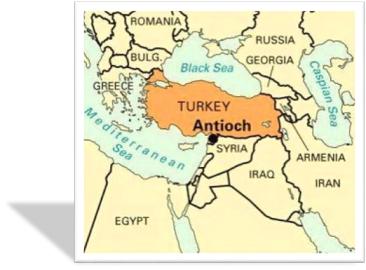The Christian First in Series: What Is a Christian?
The Christian First in Series: What Is a Christian?
Read Acts 11:19-30.
Well, we are beginning a new series today. It will last for ten weeks, and our theme is What is a Christian? And we have tried to bring out that on the bulletin by the way in which the word ‘is’ is emphasized. We are not so much thinking in these weeks about answering the question “What is a Christian?” the way it often is answered – “Well, a Christian is somebody who does this and a Christian is somebody who does that.” We are really asking the question: “What really is a Christian?”
If you said, “What is a Scotsman?” I suppose people might answer that question by saying, “A Scotsman is somebody who wears a kilt” or “A Scotsman is somebody who speaks with a strange accent.” All kinds of things. But none of these would be an accurate definition of what a Scotsman really is. If I were to say, “What is an American?” and somebody were say, “Well, Americans are people who speak English with a strange accent” that to some of us might be true, but that would not define the essence of what it means to be an American. So how does the Bible teach us what it means to actually be a Christian?

And the Bible has a whole series of different pictures it uses to help us see from many different perspectives what it actually means to be a Christian, the very essence of being a Christian, things which are true of everybody, every single person who is a Christian. And we chose this passage today because, as you would notice in it, it was in the city of Antioch that people who followed the Lord Jesus were first called Christians. It looks as though ‘Christian’ is not a name that Christians chose for Christians. It looks as though ‘Christian’ is a name that was chosen by pagans. And we are told here in verse 26 that after Barnabas and Saul, that is Paul, had been teaching this little church for about a year, it was in the city of Antioch that the disciples (who seem to regard themselves by the name of "followers of the way." The Lord Jesus was the way, the truth and the life, and they thought of themselves as followers of the way), but in Antioch people started calling them "Christians." I wonder what was in their minds. We get a little clue about this in the fact that there are only two other occasions in the New Testament where Christians are called Christians. So here is something to drop into the next party you are at, or dinner you are at, where there are people from other churches: Do you know how many times in the New Testament Christians are called ‘Christians’? Because the answer is: hardly ever.
The two other occasions are very interesting. The second occasion is towards the end of the Acts of the Apostles, when King Agrippa says to Paul, as Paul is speaking the gospel to him, “Do you think it is this easy to persuade me to be a Christian?” (Acts 26:28). (Transcription of audio file from 07:44 to 08:01 omitted.) Now, that was the flavour that the word ‘Christian’ had in the mouths of people in the first century. It was a word used in the mouths of those who despised the Christian church – caused them to suffer, as Peter says; demeaned them, as Paul experienced – or in the city of Antioch, which was the third city of the Roman Empire (after Rome and Alexandria), and among the classical Roman authors who did write in Latin it was known as a place that was full of immorality. There is a famous saying of one of the great Roman satirists, Juvenal, (whom you have probably read if you did high school Latin), who said that the Orontes River poured its pollution into the River Tiber, so that, as it were, from Turkey (where Antioch was) the pollution and the immorality of the city was known in faraway Rome and even seemed to have an influence on Romans who went perhaps along the great trade routes and did trade in the city of Antioch. So it was not a friendly description.
And therefore, I think we can assume that there was only one thing that these people in Antioch knew about Christians, and that is that somehow or another (although they had no understanding of what this meant), they were Christ’s ones, which is what the word ‘Christian’ really means. They were people who, somehow or another, were obsessed with Jesus Christ. I wonder if people in Colombia would realize that, would give us that kind of name. In your church, in our church – we are here from different churches – that “These are people who seem to have an obsession about Jesus Christ.” I ask that question because of two things I was thinking about earlier today. A few years ago we were driving through England, and we stopped at one of these absolutely beautiful English towns with its lovely cathedral. We went into the cathedral and I looked around and I thought, “If I were a man from Mars asking myself, ‘What is the function of this building?,’” because on my way down in my space-machine I had seen people coming to that building on a Sunday morning and I was intrigued to know what was it that brought these people together – I looked around the whole building. There was not a single scrap of information that told me anything about Jesus, anything about being a Christian. There was stuff that told me about how old the building was, about who the stone-mason was, about how they needed money to keep the place up. There was not a single word about what it would mean to be a Christian.

Something even closer to home. Ten years ago, the week after 9 /11 we decided in the church I served (we usually had a midweek service) that on this occasion that we would have another service to which people who, as you were, were stunned by what had happened in the United States would come. And people did come, but what we did not know was that the city had arranged a similar service in the city square just about a hundred yards away from where our church was. I was not able to go to that service, and in some ways I was relieved I had not gone, because the city had brought together an imam from one of the mosques, a rabbi from one of the synagogues, and a minister. I should underline he was a Presbyterian minister. He was not a Methodist, he was not a Congregationalist, he was not a Baptist, he was a Presbyterian. He was my kind of minister. But somebody in our congregation had been wandering through the square and stopped and listened to the service. And this is what they said: “You know, when the rabbi took part it was so clear he was a Jewish rabbi. When the imam took part, it was so clear he was a Muslim cleric. When the minister took part, you would not have known what he was.”
So actually, my question about our church and our churches and ourselves is: what would people think a Christian was? What would my life convey about what a Christian is? Now, that is the reason it is so important for us to try and study the New Testament to see what does the New Testament actually teach us a Christian is? And you will notice on the back of the bulletin today there is a whole list of descriptions that the New Testament actually uses to describe what it means to be a Christian. The fascinating thing is that the materials out of which those titles are crafted are almost all (actually really, all) found in the story of this little Christian community that was growing and growing in the city of Antioch where they were first called Christians. I want us (it will just take us two minutes for each of them) to look at five of the leading characteristics of these people that called forth the descriptor ‘Christian’ and that belong to the very essence of what it means for you and for me to be Christians. And the five are these:
Trust in Christ⤒🔗
First of all, they clearly trusted in Jesus as their Saviour and Lord. Look at what is said in verse 20; these men of Cyprus and Cyrene came to Antioch and spoke to the Hellenists, preaching the Lord Jesus. Now, that is the briefest New Testament summary of who Jesus is and what it means to be a Christian. He is Jesus who has come to die on the cross, rise again from the dead, in order to be our Saviour. “You will call his name Jesus, because He will save His people from their sins” (Matthew 1:21). And you will also call Him "Kurios," or Lord, because when you come to Him to be your Saviour you also come to Him to bow before Him and acknowledge Him as the Lord of everything in your life. And that is the first thing. That is the quintessence, the sine-qua-non, without which it is not possible actually to be a Christian. We can try to do Christian things, but we cannot be Christians.
Actually, people would be amazed at the number of American things I tried to do. But no matter how many American things I try to do, none of them makes me an American. And in the same way, many people I think try to do Christian things, as though by doing Christian things we could become Christians. But Luke, who writes the Acts of the Apostles, is just giving us this little reminder that the absolute foundation of being a Christian is my faith in the Lord Jesus Christ, the reception of Him as my Saviour and the yielding to Him as my Lord, so that He becomes everything to me and in everything in my life He is the central focus and longing.
Work of the Holy Spirit←⤒🔗
The second thing that Luke says is that they not only trusted in Jesus as Saviour, but they experienced the hand of the Lord in their lives. Now, the hand of the Lord is a Bible expression for the power of God, and it refers almost always to the presence of the Spirit of the Lord. And it is interesting, the way in which here and right at the beginning of the Acts of the Apostles Luke describes what is involved in becoming a Christian. He says these people were “added to the Lord.” They were added to the Lord! Now, just notice the form of that verb. We are told they repented and believed, so there really was a response that they made to the gospel. But there was this other dimension, as though someone else took them and added them to the Lord. They became conscious that there was another hand at work, there was another voice speaking in their hearts.
I remember that from my very earliest Christian days I felt as though I was being pursued by somebody I could not see. And no matter where I turned, it was almost as though everywhere you turned you seemed to bump into the pursuer. And that was their experience. And, of course, the interesting thing is that Luke does not say here or anywhere else, “When somebody becomes a Christian it happens in exactly this way.” The only thing that is common to everyone becoming a Christian is that we come to trust in the Lord Jesus and turn away from our sins – he actually says that – but the ways in which the Lord brings us to that are as varied as we are individuals. With some of us it is a dramatic experience; with others it is a very quiet experience. A few chapters later on Luke will make very clear that that is the case. Here is a man who needs an earthquake to bring him to faith in Christ. And here is a woman, Lydia the seller of purple, and she hears the word of Jesus and the Lord opens her heart. But there is a trust in Christ as Saviour and Lord, and there is a sense that the hand of the Holy Spirit has brought us to faith in Him.

Grow in Knowledge←⤒🔗
And then the third thing Luke mentions is that true Christians begin to grow in the knowledge of the Lord. Something very remarkable happens here. We are told that many people were added to the Lord, and then Luke tells us again more people were added to the Lord. And what did Barnabas thinks about this when he came down? He said, “These people are so hungry to know the Lord and to grow in the Lord, I need help!” And so he hotfoots it off to Tarsus and he brings back Saul, because Saul has become a gifted teacher of the gospel of Jesus Christ, and together for a year they teach these young Christians. And if the rest of the Acts of the Apostles is anything to go by, they did that very intensively, because they were hungry. And that is what it means.
That’s actually really a good test of where my spiritual life is. Isn’t it one of the lovely things about watching young babies when they are your grandchildren, and their hunger for their mother’s milk and to be fed? One of our youngest grandchildren has just got to the stage where she seems to recognize mealtime, and so round about suppertime she actually goes and gets our daughter’s apron and brings it to her, as though to say, “Feed me. I am hungry! Feed me!” So appetite is a sign of life! You go to the doctor and he asks very basic questions. You might have a pain somewhere, but he’ll say, “How is your appetite?” And you may not have noticed, and you have lost your appetite – that is a sign of sickness. So to have an appetite, this was the third thing.
Transformed Lives←⤒🔗
The fourth thing was this: their whole lives were transformed in order to serve the Lord. Now, it is absolutely marvellous what Luke tells us here, because when Barnabas comes down to Antioch (look at what Luke says in verse 23), he came and he saw something. I wish our churches were like this – people came and they saw something. Do we use that expression? We are attracted to somebody and someone says, “What was it that attracted you to that person?” and you say, “I’m not quite sure, I just saw something in them.” I saw something in them! It is something about them. And that is what had happened here in these very early Christians. The grace of God had come upon them. Now grace is not visible, but when grace comes upon the people of the Lord it becomes immediately visible in a transformed life.

And you see that later on in the care that they begin to have. I mean after all, this is a bunch of Gentile dogs, and they hear that Jewish Christians are suffering in Jerusalem. There is famine in Jerusalem. The Nile has flooded and destroyed the crops, and there is also famine in Judea. And they say, “We have got to do something to help our brothers and sisters.” So lives have been so marvellously transformed by the grace of God. You know, we all have our dream churches. Part of my dream is that a stranger coming into the churches to which you and I belong will be able to say to somebody, “You just need to go among these people.” And nobody needs to explain anything to you; you can see it there.
Infectious Faith←⤒🔗
And that is why the fifth thing that Luke mentions – they trusted in Christ as Saviour and Lord, they experienced the hand of the Lord, they began to hunger for the knowledge of the Lord, they were transformed into living lives for the Lord – and so there was an infectiousness about their faith in the Lord. And we see that in verse 21: “The hand of the Lord was with them, and a great number who believed turned to the Lord.” And again in verse 26: “He brought Saul to Antioch, and for a whole year they met with the church and taught a great many people.” Now, we sometimes wonder why our churches are not growing. And there may be many different levels of answer to that question, but one of the levels of answer may be because we are not really like this. Because when God’s people are like this, there is an infectiousness about it all that makes people think, almost under the surface, “I see something in him or her I don’t see in myself, and I just can’t make out what it really is," until they begin to discover that this is what it is: it is that we have become Christians.

Add new comment